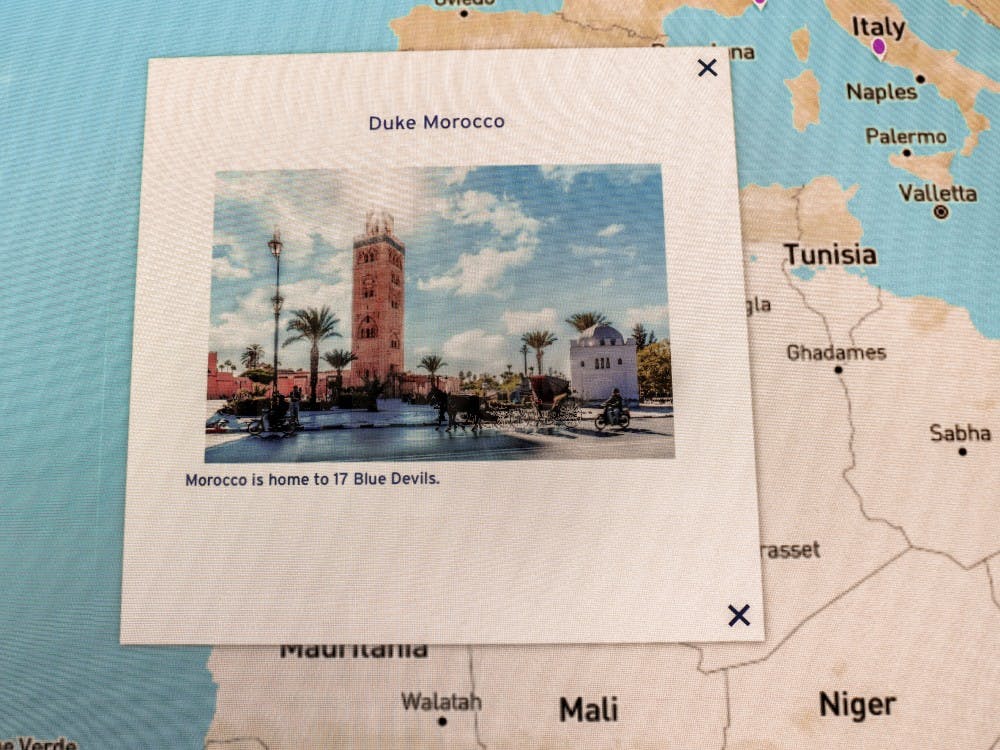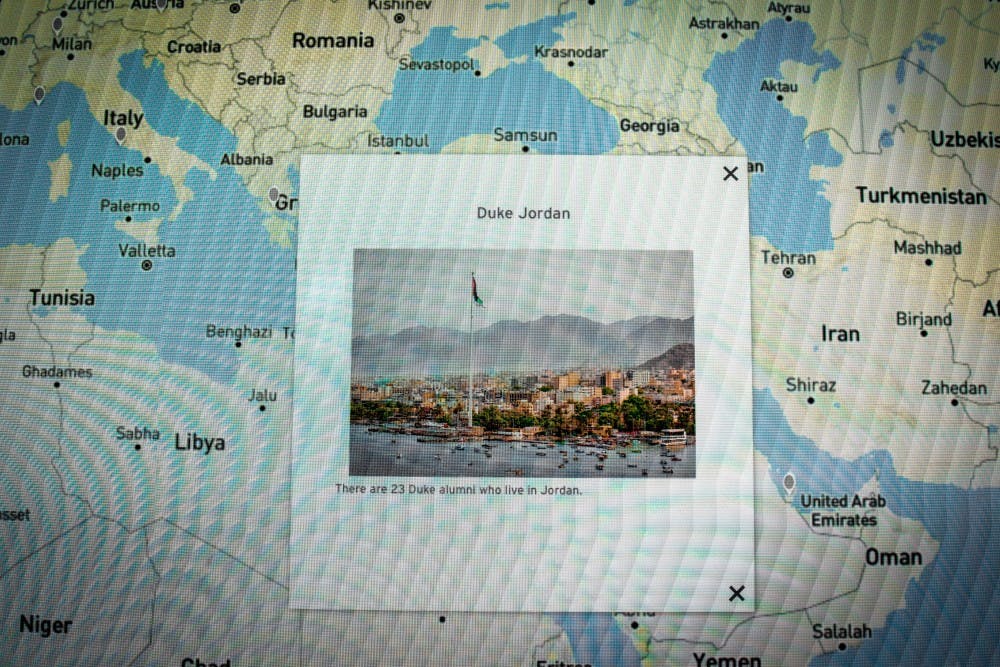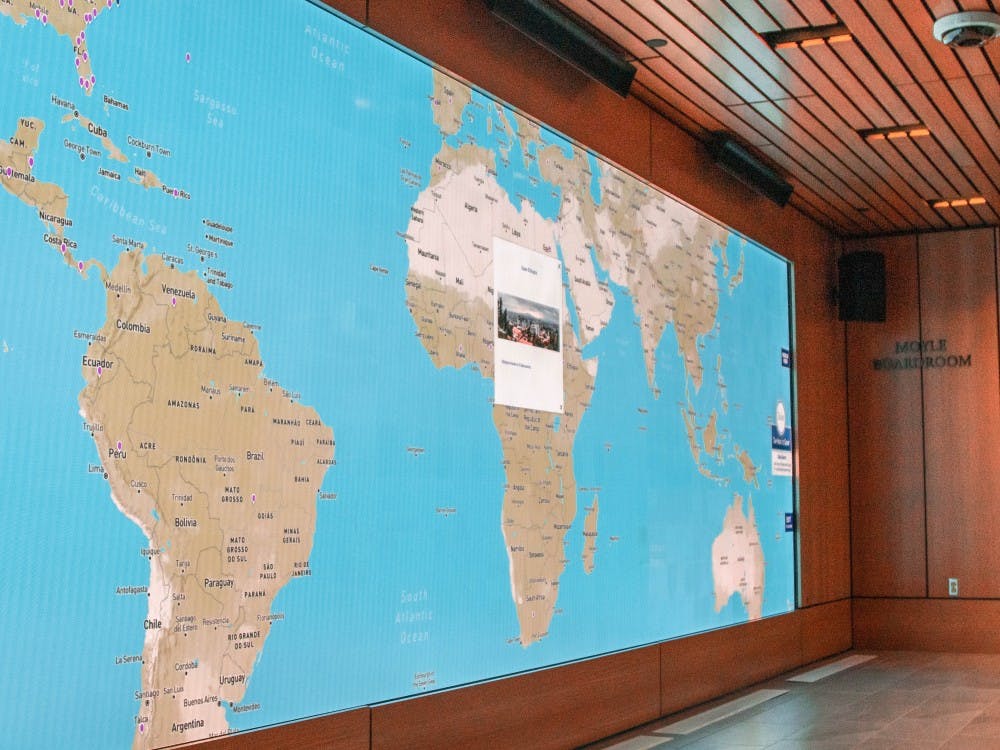The day of the Center’s official launch, the Virtual Duke digital wall at the Karsh Alumni and Visitors Center displayed images that represented Ghana with huts, Morocco with sand dunes and Jordan with someone riding a camel.
After students called out the way those countries were portrayed on the wall, the Duke Alumni Association decided to use different images for the Center’s Duke Around the World feature on its technology wall, according to Scott Greenwood, chief operating officer of the DAA.
“We appreciated the student calling our attention to the photos and replaced them with different ones," Greenwood wrote in a statement sent to The Chronicle. "We will continue to strive to ensure that the images the Duke Alumni Association presents in the Karsh Alumni and Visitors Center represent Duke’s rich diversity and core value of inclusion.”
Senior Hadeel Abdelhy initially tweeted photos of the depictions Sept. 28, commenting that “the way African and Middle Eastern countries are represented is truly wild.”
Senior Sandra Luksic later replied to Duke Alumni’s announcement of the Center’s opening on Twitter, calling the portrayal of African and Middle Eastern countries “racist and backward” and demanding they “change it now”.
Duke Alumni replied that they would investigate the depictions.
The digital wall is the largest interactive touchscreen in the state, and users can select features such as notable alumni and all-star awardees, donor impact and a campus map, in addition to exploring where around the globe members of the Duke community call home.
The Chronicle visited the technology wall Oct. 2 and Oct. 14 and observed that the pictures had been changed. Jordan’s picture was changed to a coastal cityscape, Ghana’s to a waterfall and Morocco’s to a city square with a tower, palm trees and a horse-drawn cart.
Additionally, The Chronicle took pictures of all of the Middle Eastern and African countries depicted on the wall, and noticed that the wall lacked a picture for Nigeria in both of the times that The Chronicle visited.
Abdelhy wrote in an email to The Chronicle that it’s “really good news” that the depictions have been changed and wondered whether the pictures of Ghana, Jordan and Morocco were the only ones that had been changed.
Luksic was skeptical of the impact of Karsh replacing the photos and wrote in an email that the depictions are “part of a larger problem regarding Duke's racism and colonialist legacy.”
“This is not the first time Hadeel has pointed something out and I have messaged Duke's social media to try to get it taken down,” they wrote.
Abdelhy and Luksic both noted that images of huts, camels and deserts are stereotypical representations of African and Middle Eastern countries. Luksic argued that the stereotypes “justify anti-Muslim and anti-Black attitudes and violence,” adding that Abdelhy’s tweets demonstrated how “these stereotypes are naturalized and almost hidden in seemingly small instances, such as the photos in the Karsh Center.”
“What baffles me is that Duke prides itself on being a global institution and celebrates its many international alumni but is incapable of representing them properly,” Abdelhy wrote. “This is especially the case for African and Middle Eastern students where incidents like this are not isolated, a quick look at many programs at Duke shows that this how the university sees us: poor, underdeveloped, underprivileged.”



Get The Chronicle straight to your inbox
Signup for our weekly newsletter. Cancel at any time.

Stefanie Pousoulides is The Chronicle's Investigations Editor. A senior from Akron, Ohio, Stefanie is double majoring in political science and international comparative studies and serves as a Senior Editor of The Muse Magazine, Duke's feminist magazine. She is also a former co-Editor-in-Chief of The Muse Magazine and a former reporting intern at PolitiFact in Washington, D.C.

